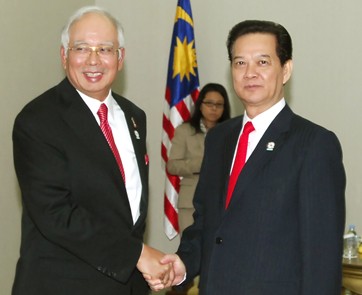(VOVworld) – A ceremony was held at the Presidential Palace in Hanoi Friday to welcome the Malaysian Prime Minister, Dato Sri Mohd Tun Razak. After the ceremony, Prime Minister Nguyen Tan Dung held talks with his Malaysian counterpart Dato Tun Razak.
During the talks, PM Dung praised Malaysia as one of Vietnam’s leading investment and trade partners, with two-way trade turnover reaching 9 billion USD in 2013, up 67% from 2010. The two leaders agreed to raise their bilateral trade turnover to 11 billion USD by 2015, encouraging and facilitating businesses from both sides to enhance reciprocal trade and investment. Both Prime Ministers agreed to sign a Memorandum of Understanding (MOU) on rice trading as soon as possible, while accelerating cooperation in labor, agriculture, oil and gas, education, law, and the judiciary. They welcomed the signing of an MOU on Vietnam-Malaysia agricultural cooperation to soon fully tap each country’s agricultural potentials. They highly evaluated bilateral cooperation in security and defense and pledged to sign agreements on joint patrol activities, the establishment of a hot line between the two navies, and cooperation in the fight against trans-national crimes. They also reached agreement on preparations for the 5th meeting of the Vietnam-Malaysia Joint Committee to implement their concluded agreements.

PM Nguyen Tan Dung and his Malaysian counterpart Najib Tun Abdul Razak, Pnom Penh, Cambodia, November 19, 2012
Photo: VGP
|
Regarding international issues of mutual concern, both sides affirmed continued cooperation at regional and international forums with other ASEAN countries towards the building of the ASEAN Community by 2015, and an ASEAN vision in the post-2015 period. PM Dung confirmed that Vietnam supported Malaysia in assuming the ASEAN presidency in 2015.
Both leaders stressed the importance of maintaining peace, stability, freedom, security, and maritime and air safety in the East Sea, supporting the ASEAN common stance as stated in the Declaration on the ASEAN 6-point principle regarding the East Sea, settling disputes by peaceful means in accordance with international laws, particularly the 1982 UN Convention on the Law of the Sea, while strictly following the Declaration on the Conduct of Parties in the East Sea (DOC). They also agreed to develop a Code of Conduct for Parties in the East Sea (COC).
Regarding the Trans-Pacific Partnership Agreement, the Prime Ministers agreed on continued cooperation and mutual support, boosting the completion of negotiations while ensuring reasonable changes and appropriate technical assistance to enhance the capacity of developing countries. They pledged to lift bilateral ties to strategic partnership level.